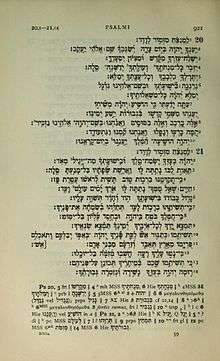Psalm 21

Psalm 21 is the 21st psalm from the Book of Psalms. It is internally accredited to King David.
This psalm is a psalm of thanksgiving. It focuses on the imagery of a king, who is often credited with being an example of the moral state of a kingdom in the Old Testament.[1]
Full Text
The following is the full English text of the Psalm from the King James Bible.
Psalm 21
(To the chief Musician, A Psalm of David.)
1 The king shall joy in thy strength, O LORD; and in thy salvation how greatly shall he rejoice!
2 Thou hast given him his heart's desire, and hast not withholden the request of his lips. Selah.
3 For thou preventest him with the blessings of goodness: thou settest a crown of pure gold on his head.
4 He asked life of thee, and thou gavest it him, even length of days for ever and ever.
5 His glory is great in thy salvation: honour and majesty hast thou laid upon him.
6 For thou hast made him most blessed for ever: thou hast made him exceeding glad with thy countenance.
7 For the king trusteth in the LORD, and through the mercy of the most High he shall not be moved.
8 Thine hand shall find out all thine enemies: thy right hand shall find out those that hate thee.
9 Thou shalt make them as a fiery oven in the time of thine anger: the LORD shall swallow them up in his wrath, and the fire shall devour them.
10 Their fruit shalt thou destroy from the earth, and their seed from among the children of men.
11 For they intended evil against thee: they imagined a mischievous device, which they are not able to perform.
12 Therefore shalt thou make them turn their back, when thou shalt make ready thine arrows upon thy strings against the face of them.
13 Be thou exalted, LORD, in thine own strength: so will we sing and praise thy power.
Themes
Commentary by the theologian John Calvin, relates this psalm to the belief that God had appointed a succession of rulers on Earth, starting with David eventually leading to the messiah, who Calvin identified as Jesus. Calvin also implies that this psalm does not refer to a specific king, but to all kings.[2]
References
- ↑ The Artscroll Tehillim page 38
- ↑ Calvin, John. "Calvin's Commentaries, Vol. 8: Psalms, Part I". Sacred Texts. Retrieved 25 June 2015.